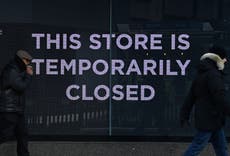Boris Johnson dismisses predictions of the death of the commute
Workers will be ‘consumed with desire’ to get back to the office in a few months’ time, says PM
Your support helps us to tell the story
From reproductive rights to climate change to Big Tech, The Independent is on the ground when the story is developing. Whether it's investigating the financials of Elon Musk's pro-Trump PAC or producing our latest documentary, 'The A Word', which shines a light on the American women fighting for reproductive rights, we know how important it is to parse out the facts from the messaging.
At such a critical moment in US history, we need reporters on the ground. Your donation allows us to keep sending journalists to speak to both sides of the story.
The Independent is trusted by Americans across the entire political spectrum. And unlike many other quality news outlets, we choose not to lock Americans out of our reporting and analysis with paywalls. We believe quality journalism should be available to everyone, paid for by those who can afford it.
Your support makes all the difference.Boris Johnson has dismissed predictions of the death of the commute after months of working from home, insisting that workers will be “consumed with desire” to get back to the office as soon as social-distancing rules allow.
Speaking to a rail industry conference, the prime minister said he expected that “in a few short months” commuters would return to trains and buses for their daily journey to work.
He also made clear he intends to press ahead with what he describes as “the biggest investment in rail since the Victorian age” to help public transport systems cope with the expected flood of passengers.
The discovery over the past 12 months that many employees are able to do their jobs working from home has led to much speculation of a permanent decline in commuting, with knock-on effects on the value of city-centre office space.
A recent report by PWC found that Covid-19 had “fundamentally changed the way we view cities”, with urban dwellers rethinking the importance of larger homes and green spaces to the extent that London’s population could decline for the first time in the 21st century.
An August 2020 survey conducted by the London Assembly found that 4.5 per cent of the capital’s inhabitants said they would definitely move out of the city within the next 12 months, driven by opportunities to work from home.
But Mr Johnson gave short shrift to beliefs in a Covid-driven shift in the mobility of the UK’s workforce.
“I know that some people may imagine that all conferences from now on are going to be like this, held over Zoom, Teams or what have you and we’ve got to prepare for a new age in which people don’t move around, do things remotely, they don’t commute any more,” he told the Railway Industry Association.
“But I want you to know, I don’t believe it. Not for a moment. Because in a few short months, if all goes according to plan, we in the UK are going to be reopening our economy.
“And then, believe me, the British population will be consumed once again with their desire for the genuine face-to-face meeting that makes all the difference to the deal or whatever it is, never mind seeing our loved ones, going mom holiday or whatever.”
Guidance recommending that people work from home where possible is likely to remain in place until 21 June at the earliest – when legal social restrictions could be lifted.
Mr Johnson said that when that point is reached, “the pressure on our infrastructure – so much of it antiquated and outdated – will start to grow again and risk being intolerable”.
He said: “We can’t wait for that moment … The reason this government is making these investments in infrastructure – including the biggest investment in rail since the Victorian age – is that we know that it is by infrastructure. innovation and skills that we will spread opportunity around the country.”





Join our commenting forum
Join thought-provoking conversations, follow other Independent readers and see their replies
Comments